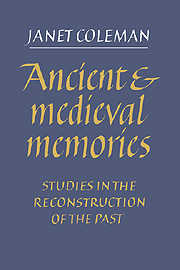Book contents
- Frontmatter
- Contents
- Preface
- List of abbreviations
- PART I THE CRITICAL TEXTS OF ANTIQUITY
- Introduction
- 1 Plato
- 2 Aristotle
- 3 Cicero
- 4 Pliny and Roman naturalists on memory; Borges's Funes the Memorious
- 5 Plotinus and the early neo-Platonists on memory and mind
- 6 Augustine: the early works
- 7 Augustine's De Trinitate; on memory, time and the presentness of the past
- PART II THE PRACTICE OF MEMORY DURING THE PERIOD OF TRANSITION FROM CLASSICAL ANTIQUITY TO THE CHRISTIAN MONASTIC CENTURIES
- Introduction
- PART III THE BEGINNINGS OF THE SCHOLASTIC UNDERSTANDING OF MEMORY
- Introduction
- PART IV ARISTOTLE NEO-PLATONISED: THE REVIVAL OF ARISTOTLE AND THE DEVELOPMENT OF SCHOLASTIC THEORIES OF MEMORY
- Introduction
- PART V LATER MEDIEVAL THEORIES OF MEMORY: THE VIA ANTIQUA AND THE VIA MODERNA.
- Introduction
- Conclusion: an all too brief account of modern theories of mind and remembering
- Bibliography
- Index
6 - Augustine: the early works
Published online by Cambridge University Press: 06 January 2010
- Frontmatter
- Contents
- Preface
- List of abbreviations
- PART I THE CRITICAL TEXTS OF ANTIQUITY
- Introduction
- 1 Plato
- 2 Aristotle
- 3 Cicero
- 4 Pliny and Roman naturalists on memory; Borges's Funes the Memorious
- 5 Plotinus and the early neo-Platonists on memory and mind
- 6 Augustine: the early works
- 7 Augustine's De Trinitate; on memory, time and the presentness of the past
- PART II THE PRACTICE OF MEMORY DURING THE PERIOD OF TRANSITION FROM CLASSICAL ANTIQUITY TO THE CHRISTIAN MONASTIC CENTURIES
- Introduction
- PART III THE BEGINNINGS OF THE SCHOLASTIC UNDERSTANDING OF MEMORY
- Introduction
- PART IV ARISTOTLE NEO-PLATONISED: THE REVIVAL OF ARISTOTLE AND THE DEVELOPMENT OF SCHOLASTIC THEORIES OF MEMORY
- Introduction
- PART V LATER MEDIEVAL THEORIES OF MEMORY: THE VIA ANTIQUA AND THE VIA MODERNA.
- Introduction
- Conclusion: an all too brief account of modern theories of mind and remembering
- Bibliography
- Index
Summary
For the truths which the intellect apprehends directly in the world of full and unimpeded light have something less profound, less necessary than those which life communicates to us against our will in an impression which is material because it enters us through the senses but yet has a spiritual meaning which is possible for us to extract.
M. Proust, Remembrance of Things Past: Time Regained.Related things are things remembered and for a creator, certainly for a Spanish creator of the twentieth century, remembered things are not things seen, therefore they are not things known. And so then always and always Picasso commenced his attempt to express not things felt, not things remembered, not established relations but things which are there, really everything a human being can know at each moment of his existence and not an assembling of all his experiences.
Gertrude Stein, Picasso (London, 1939), p. 35.During the mid-fourth century, the African professor of rhetoric, Marius Victorinus joined the Christian church; he also translated Plotinus and other neo-Platonists into Latin. This excited the fashionable Platonist circles in Milan, where Augustine had gone to pursue his rhetorical career. Already much of the current Platonism was of a Christian variety, Bishop Ambrose drawing on the insights of pagan philosophy and adapting them in his sermons. With Victorinus's translations of Plotinus and other neo-Platonic writings – translations that were provided by a man known to have died as a Christian – Christian Platonism received an incalculable boost.
- Type
- Chapter
- Information
- Ancient and Medieval MemoriesStudies in the Reconstruction of the Past, pp. 80 - 100Publisher: Cambridge University PressPrint publication year: 1992

